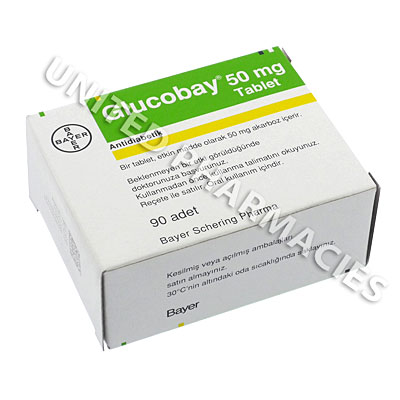Customers also like
Diavista (Pioglitazone Hydrochloride) - 30mg (10 Tablets)
our best price : $9.66
Rezult (Rosiglitazone Maleate) - 4mg (10 Tablets)
our best price : $7.98
Daonil (Glibenclamide) - 5mg (10 Tablets)
our best price : $1.47
Accarb (Acarbose) - 100mg (90 Tablets)
our best price : $55.44
Metformin Mylan (Metformin Hydrochloride) - 850mg (500 Tablets)
our best price : $159.50
Amantrel (Amantadine Hydrochloride) - 100mg (15 Capsules)
our best price : $5.32
Mignar-50 (Miglitol) - 50mg (15 Tablets)
our best price : $8.93
Glizide (Gliclazide) - 80mg (500 Tablets)
our best price : $36.26
Pizaccord (Pioglitazone Hydrochloride) - 45mg (28 Tablets)
our best price : $17.22
Forxiga (Dapagliflozin) - 5mg (28 Tablets)
our best price : $69.89
Description
Glucobay (Acarbose) is classified as an alpha-glucosidase inhibitor and it is indicated for the treatment of diabetes mellitus (type 2). It works by delaying the rate at which carbohydrates are metabolized, so as to prevent reactive hyperglycemia (high sugar levels occurring after meals). This medicine is an oligosaccharide, however, it differs from other anti-diabetic medicines in that it does not stimulate the pancreas or increase the release of insulin.
Its antihyperglycemic properties are instead due to it working in the intestines and competitively inhibiting alpha glucosidases (an enzyme which functions by breaking down disaccharides, starch and sucrase into glucose). This in turn ensures that any carbohydrates consumed by the diet are digested slower, and it also means that it will take a longer time for sugar to enter the bloodstream.
Diabetic patients sometimes experience post-prandial hyperglycemia, which causes the levels of blood sugar to rise after meals. However, by slowing down the absorption of sugars, this medicine helps to prevent this, resulting in a stabilization of blood glucose levels and better control of diabetes.
Glucobay (Acarbose) is available as either 50mg or 100mg strength tablets. Your physician will advise you as to which one is most suitable. The tablets are taken either right before the consumption of a meal, or else alongside the first bite of food. This is to ensure that it can control the blood sugar levels after the meal has been eaten. In some cases, patients might be told by their physician to start with 50mg, taken 3 times per day. However, a lower initial dosage is often needed, and it is also possible that some individuals may be directed to start with 50mg, taken 1 to 2 times per day, followed by a further adjustment.
Depending on the clinical response, the physician in charge of treatment may decide to increase the dosage to 100mg (3 times per day) after 6 to 8 weeks. Further changes may also be recommended. Patients should note that due to individual factors, the dosage may be different from patient to patient. Therefore, it is important that the instructions provided by the physician in charge of treatment are closely followed. Never change your dosage unless told to do so by your physician.
Adults using Glucobay (Acarbose) should take note of the fact that side effects might occur. Talk to your physician if this happens. A list containing some (but not all) side effects is given here:
- Flatulence
- Indigestion
- Constipation
- Loose stools
- Pain or discomfort affecting the stomach
Side effects that have not been mentioned above may also occur. Attend the emergency room or see your physician immediately if you notice bloody diarrhea, abnormal bruises, serious pain in the stomach or any other severe side effects that have not been referenced here.
Glucobay (Acarbose) will generally not cause hypoglycemia. However, patients whose physician has told them to take other antidiabetic medicines alongside this one may experience a drop in sugar (hypoglycemia). Ask your physician what to do if this occurs.
Frequent visits to your physician may be arranged for patients taking this medicine, so that their blood sugar levels can be regularly tested. This will allow your physician to make any needed changes to the dosage regimen.





















